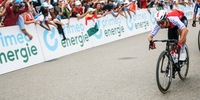
Background information
My first time at the Tour de Suisse: from Beat Breu to Bryan Coquard
by Patrick Bardelli

It starts off leisurely, then gets a bit hectic before a sweaty climb up to Gotthard Pass. I accompany the sporting director of the Q36.5 Pro Cycling Team on a stage of the Tour de Suisse. After 171 kilometres in the team car, I’m done in.
«You need a strong stomach for this», I think to myself. Luckily I have one, because I’m going to need it today. I’m sitting in the team car of the Swiss Q36.5 Pro Cycling Team on the fourth stage of the Tour de Suisse heading south. The team’s sporting director, Alex Sans Vega, sits at the wheel and steps on the accelerator pedal. Mechanic Cédéric Stähli sits on the back seat, and with him a lot of spare wheels which end up only coming to use shortly before the start. But let’s start from the beginning.
There’s a first time for everything: the first kiss, the first heartbreak, the first Tour de Suisse. And this year was my first time. At the finish of the second stage in Regensdorf, I stood fascinated at the finish line and eagerly awaited the arrival of the peloton. Want to hear my thoughts on it? Here you go.
Does it get better than that? Yes, absolutely.
Seven riders from five nations are taking part in the Tour de Suisse for the Q36.5 Pro Cycling Team this year. During eight stages, they’re accompanied by 20 staff members, 21 road bikes, seven time trial bikes and around seven tons of other equipment. Several support vehicles and a team bus transport people and equipment across Switzerland during the eight stages. A logistical challenge and masterpiece.
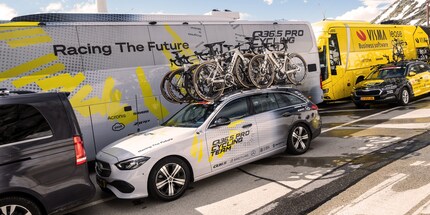
On the fourth stage up to Gotthard Pass (on Wednesday 12 June), 28 people set off south from Rüschlikon. As part of a Galaxus theme week, I did an article on autologous blood therapy for osteoarthritis. Orthopaedic surgeon Dr Marcel Gloyer treats patients with this therapy at Zurich Alphaclinic (page in German).
The specialist in orthopaedics and traumatology of the musculoskeletal system also works as one of the team doctors for the Swiss cycling team. At his invitation, I stand by the team bus shortly before the start in Rüschlikon with wide eyes and clammy hands. For the athletes, the first mountain stage lies ahead of them. For me? A wild drive of around 170 kilometres.
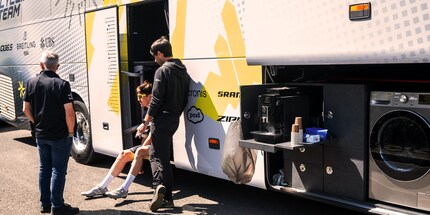
Before they set off, the team handle everything in a very calm and professional manner. The mechanics get the bikes ready, the tactics for the day are discussed once more in the team bus (more on this later) and individual riders warm up on their wheels. There’s a strong sense of «business as usual». Looks like it’s just me who’s nervous. After all, I’ve never had the opportunity to be so close to a professional cycling team. And I’ll probably never get that chance again.
After the mandatory team presentation, the virtual starting signal is given at 12.30 pm. Shortly before that, the team suffers its only defect of the day, at least the only one I notice. One rider has a flat rear tire. So the mechanic changes the wheel and the stage begins. «Better now than during the race,» says Cédéric Stähli.
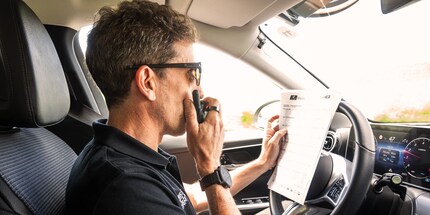
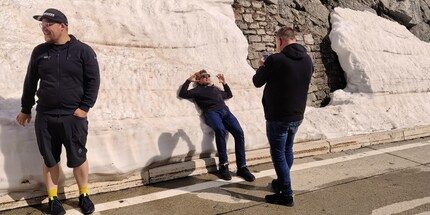
After a two and a half kilometre neutral zone, the race organisers open the stage. Ready, steady, go! The first hour of the race is hectic and super fast covering around 43 kilometres. Mind-blowing, considering they already have a few climbs to contend within the first few kilometres. I want to hear from Alex Sans Vega what their tactics are for today.
We definitely want to get a rider into the escape group today, to the start of the climb to Gotthard. This’ll then act as a relay station for other riders in the team.
Swiss rider Matteo Badilatti then makes two attempts to catch the right breakaway group. On the third attempt it works and some riders are able to break away – but none of them are on the Q36.5 Pro Cycling Team. The sports director isn’t happy.
After that, calm returns – at least tactically. The peloton lets the escape group go, with a maximum lead of just under seven minutes. But the race is by no means slowing down. In the second hour of the race, the riders cover an incredible 47.9 kilometres. I still vaguely remember times when something like this would’ve been a world hour record on the track. How times have changed.
Now and again, I’m able to find a moment to talk to Alex Sans Vega and Cédéric Stähli about cycling that isn’t related to the current events. Alex comes from Barcelona and has already worked for Q36.5’s predecessor team, Dimension Data. His team is still in a kind of discovery phase. Many riders had to be signed up in a short space of time, so they’re still lacking a clear team identity. «We still have to work on that,» he says.
Cédéric originally wanted to become a car mechanic so that he could work in Formula 1. After a trial apprenticeship, however, he decided it wasn’t for him. «To put it simply, you connect a computer to the vehicle, it analyses what’s broken and you replace it. I didn’t really enjoy it.» So he became a bike mechanic. After his apprenticeship and various engagements with smaller teams, he worked for Swiss Cycling and Tudor. And now for the Q36.5 Pro Cycling Team.
I’m keen to know some of the highlights of his career so far. «The collaboration with Marlen Reusser during the Olympic Games in Tokyo is definitely one of them». There, 33-year-old Reusser won the silver medal in the individual time trial.
Plans after the Tour de Suisse? «Next up are the German and Swiss championships in the time trial and on the road. And then I’ll be working for Luxembourg at the World Championships in Zurich in September.» The bike mechanic business is international. Meanwhile, we’re approaching Altdorf and the riders ask for refreshments.
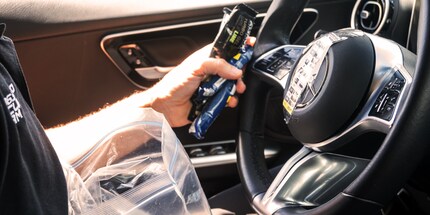
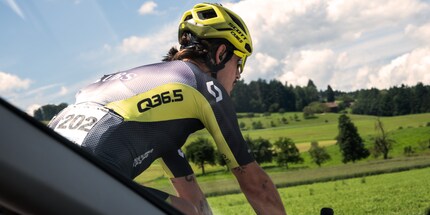
Since none of his riders made it into the escape group, Alex calls out plan B. The plan is for the team to reduce the gap to the outliers as much as possible and work its way up the rankings at the end of the day with the two riders for the overall classification, Matteo Badilatti and David de la Cruz. You can sense there’s a lot of pressure on the Swiss team to deliver good results in their home tour. We’re now in Altdorf.
The gap between the peloton and the leading group is still around six minutes. Alex informs his riders over the team radio and asks them to close the gap further. By the time they reach the foot of Gotthard, his team will have made up half of the maximum seven-minute deficit.
As well as the internal team radio, we listen to the tour radio all day long. Here, the sporting directors of all 24 teams are constantly informed of backlogs, technical defects, crashes and tasks. Like, if a rider in the field asks for his team car, this is communicated on this channel and the sporting director drives to the front. Each team vehicle drives in the convoy according to the team ranking list. We’re in 17th position today. Once they’ve done what they need to, the sporting director has to return to his place.
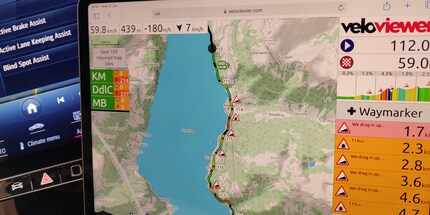
Alex Sans Vega drives, feeds the riders, listens to the tour radio and passes this information on to his drivers via the team radio. He then has an app on a tablet which he can see all the information about the route on. He also passes this information on by radio. «The gradient continues like this for the next two kilometres, then it gets flat for three kilometres before getting very steep for 4.5 kilometres.» He then operates a third radio, which he uses to communicate with the team’s second sporting director or with the helpers waiting for the riders at the refreshment points with the musettes, which are bike bags containing food and drink for the riders. «At 61.5 kilometres you get your musettes.» And finally, he also has a list on his knees with the start numbers of all the riders.
Oh yes, he also has his smartphone on the windshield playing the direct broadcast of the race on Swiss national television. I’ve no idea how Alex’s brain processes all of this at once. However, I have the utmost respect for this performance. I ask him if he can remember his first assignment as the sporting director of a team. «Yes, I was exhausted after the race, got to the hotel and fell into bed.»
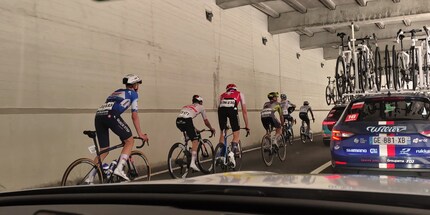
After 171 kilometres and a climb of around 33 kilometres with an average gradient of almost seven per cent, the riders reach the finish on the Gotthard Pass four and a half hours later. No stage victory in sight for the Q36.5 Pro Cycling Team. Matteo Badilatti and David de la Cruz weren’t able to make a real improvement in the overall standings either. Both come outside the top 20 after the first uphill finish, each more than two minutes behind.
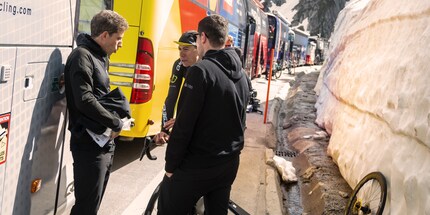
It’s also a quiet day for the team doctor. The riders were all fit before the stage started and there weren’t any medical problems or crashes during the stage. «The best thing for everyone is when I have nothing to do,» says Dr Marcel Gloyer at the finish. In the event of a crash or health problems during the stage, the medical team accompanies the riders to hospital and organises fast and professional treatment either on site or with international specialists.
Incidentally, the stage goes to Torstein Træen (Bahrain Victorious) from Norway, who celebrates his first victory at the highest level of the race. Another first!
After a long, exciting day full of observations and adrenaline, I’m back home. And fall into bed dead tired. I more or less spent the whole day in the passenger seat. I think about the rider’s performance and also that of Alex and Cédéric, who’s probably still in the workshop getting the bikes ready for the next day. Then I fall into a deep, deep sleep.
From radio journalist to product tester and storyteller, jogger to gravel bike novice and fitness enthusiast with barbells and dumbbells. I'm excited to see where the journey'll take me next.
Interesting facts about products, behind-the-scenes looks at manufacturers and deep-dives on interesting people.
Show all